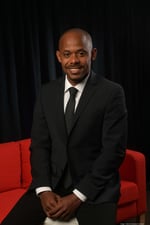Three legal mavericks share their experiences on the road to success.
 Salomon Laguerre
Salomon Laguerre
Sr. Counsel, Legal – Employment Law, Chick-fil-A
I think people who’ve known me for the past five or six years think that I’ve always had it together, and that I’ve cruised through my educational and professional life, but that hasn’t always been the case.
I almost didn’t go to college because I grew up in an environment where, as an immigrant, we just really had no knowledge of what the education system was like here. My GPA in high school was always good and I always did well in school, but college was always an afterthought. It was a last-minute thing where I was a senior in high school and I went to a college fair, and just by chance, I saw the schools—a lot of them I was learning about for the first time. I applied to one school and got in. That’s kind of how I ended up in college.
As someone for whom English is his second language, I was never good at any kind of standardized testing or any kind of testing. So going into the LSAT, you’re going in with people telling you that getting into a good law school is probably a long shot and to have a plan B. Because of that background, I did all the preparation, and I studied very hard.
I took the LSAT, and then I went home for the holidays. The results came back a few days before Christmas, and I completely just bombed it. At that moment, I was completely just devastated. I remember getting in my car immediately after, and I told my parents and my siblings that I’m going back to Tampa and I’m hitting the books again.
The doubt does start creeping back into your mind. But what gave me confidence that I was going to do better the second time was the preparation I put in. I had a couple of months to refresh myself and get ready and prepare again. Believe it or not, as bad as I did that first time around, I was still confident because I knew I’d put in the work, and while I don’t know what happened the first time, I knew the second time that I was going to do much better, and, ultimately, I did.
Listen to more of Salomon’s story in Bouncing Back: https://www.mlaglobal.com/en/multimedia/podcasts/bouncing-back/a-chat-with-salomon-laguerre
 Jennifer Painter
Jennifer Painter
Senior Vice President, Chief Legal Officer and Secretary,
ASGN Incorporated
The Army and the military academy are all about leadership training. I got so much out of that. The three most lasting lessons I learned from my time in the military are:
- You need to lead from the front. You need to set an example—“Follow me, do as I do!” An example from the military is that you can’t lead a run when you’re falling behind; you can’t be calling out the cadence when you’re 20 feet back from your team. You need to inspire your soldiers to be the best they can be by modeling behavior and expecting the best of them. I’ve always found that fear is a short-term motivator, and it usually backfires on you. Loyalty, trust, teamwork—those all can obtain inspiring results.
- The second lesson I learned in the military is humility. When I was 17, I had a little bit of an attitude and thought I was something. But when you see the experiences that other people bring to the table, and they know more about their jobs than you do, have them teach you what they do and learn from them. Also, set expectations that push them and push you as a group. Give your teammates credit for all the wins, because it really isn’t you.
- The last thing I learned is that food is a fun motivator! Tech company campuses with free meals, such as Facebook’s campus, have really seen the benefit of this perk. When in the Army, I would often bring juice, bagels, and donuts to our construction work sites. And boy, was I beloved—and it had nothing to do with who I was but rather was all about the food I brought. We’d have a quick meeting while enjoying the food break and off they would go back to work in a better mood. The snacks were such a little gesture, but they had an outsized impact that made a difference.
Listen to more of Jennifer’s story on Between the Legal Lines: https://www.mlaglobal.com/en/multimedia/podcasts/between-the-legal-line/between-the-legal-lines-jennifer-painter
 Raqiyyah Pippins
Raqiyyah Pippins
Partner, Arnold & Porter
I think it’s very common for junior associates in law firms to believe that the firm they’re in is the only way that firms are. So, the idea of going to another firm can seem very scary. The thing I learned—although I don’t even think I realized it until I experienced being at three different firms—is that not only are firms different, but practice groups and people are different. So much of it is just finding the right fit and personalities. That’s almost more important than finding the area of law that you’re working in.
What was really eye-opening about my transition from my first firm to my next was that there was a huge difference between being in a big office of a big firm and being in a small office of a small firm. Also, there was a difference between being a general litigation associate and being in a regulatory practice. I realized that because of my personality type, I tended to thrive in instances where there were more thinly staffed cases. That’s not something that’s talked about a lot in law school when people are choosing environments or when you’re trying to figure out what firm to join. It matters whether you find yourself liking to be on big high-stake matters, where there are several attorneys on them, or if you prefer matters where it’s just you and a partner or you and one other associate and a partner.
As you get more senior, your needs change. What I realized was you can get to a point when you have more ownership of your career, which is what happens at the counsel and partner levels. I was a counsel when I came to Arnold & Porter, a stage at which cultural fit and platform really matter. And I realized, especially in the wake of the George Floyd killing, how important it was to me to be at a firm where I had access to the management of the firm and could really facilitate changes or say things that I had been thinking and feel like I’d be supported in efforts to make real change. I found that I wanted to not only take advantage of the regulatory practice alignment but also have a larger platform for cross-selling work while also feeling really good about who I’m associated with [based on pro bono work].
Listen to more of Raqiyyah’s story on B.S.: Beyond Stereotypes: https://www.mlaglobal.com/en/multimedia/podcasts/beyond-stereotypes/bsing-with-raqiyyah-pippins



